The ScotsmanChess News February 2002 |
The ScotsmanChess News February 2002 |
to "The Scotsman" chess column
28 February 2002
A cautious start to the 19th Ciudad de Linares tournament in Spain has left many players, like Garry Kasparov and Alexei Shirov, ruing their missed opportunities at the board – rare oversights from elite grandmasters that could have given them the lead going into the first rest-day.
Kasparov, the defending champion and perennial favourite in Linares, let slip golden chances in his two opening games against teenager Francisco Vallejo and old rival Vishy Anand, and now finds himself without a win so far in the tournament after a solid fourth round draw with Vasily Ivanchuk.
Meanwhile Shirov, the Spanish No.1, finished his fourth round game against Fide world champion Ruslan Ponomariov with a nice rook sacrifice that secured a draw – the only problem was that in finding the sacrifice to secure the draw, he inexplicably overlooked a win with a very forcing continuation!

Ruslan Ponomariov vs. Alexei Shirov
Vallejo, unbeaten so far in an elite tournament many thought was above his limited capabilities, again showed his mettle with another impress game to deny the world No.4, Michael Adams, taking the lead. The Spanish teenager has now secured draws with Kasparov, Anand, Adams and Ivanchuk – respectively the world No.’s 1, 3, 4 and 8.
The seven players now go into the first official rest-day for the double round tournament (27th February), with just a half point separating the field.
Leader board: 1-3 M Adams (England), F Vallejo (Spain), A Shirov (Spain) 2/4; 4-7 V Anand (India), G Kasparov (Russia), R Ponomariov (Ukraine), V Ivanchuk (Ukraine) 1.5.
R Ponomariov – A Shirov
Ciudad de Linares (4), Sicilian Defence
1 e4 c5 2 Nf3 Nc6 3 Nc3 e5 4 Bc4 d6 5 d3 Be7 6 Nd2 Bg5 7 h4 Bxd2+ 8 Bxd2 Nf6 9 Bg5 Be6 10 Nd5 Bxd5 11 Bxd5 h6 12 Bxf6 Qxf6 13 Qd2 Ne7 14 Bc4 0–0 15 Kf1 Rad8 16 Re1 d5 17 exd5 Nxd5 18 Qe2 Rfe8 19 Qe4 Nb6 20 Bb3 Rd4 21 Qxb7 c4 22 dxc4 e4 23 Kg1 Rd7 24 Qa6 e3 25 fxe3 Rxe3? (25 ..Rd2! 26 Rf1 Qc6! 27 Rh2 Qc5 28 Kh1 Rxe3 29 Qb5 Rf2!! 30 Rg1 Qd4 with a winning attack) 26 Rxe3 Rd1+ 27 Kh2 Qxh4+ draw.
view the game online download game (pgn)
27 February 2002
THE world No.1, Garry Kasparov, has always been regarded as something of a slow starter and at the 19th Ciudad de Linares elite tournament here in Spain, he’s definitely not firing on all cylinders yet.
After missing an “easy” win in the opening round against Spanish teenager Francisco Vallejo, the lowest-rated player in the tournament, it looks as if Kasparov (who had the second round bye) missed a golden opportunity in the third round to put away his old rival, Vishy Anand.
In a commanding position, Kasparov looked to have his opponent at his mercy but failed to find the correct moves to win. During the post mortem after the five-hour game, Kasparov readily admitted that instead of his blunder of 32 Bb1, 32 Kg2! Kg8 33 Rg4 Kf8 34 Rg6 could have been the “probable” winning plan he had missed.
The two have now played 72 times in their career since first meeting here at Linares in 1991. And, after their latest draw, Kasparov still holds a commanding lead over his rival with a personal score of won 26, lost 8 and drawn 38.
With the other two games of the day also a draw, Kasparov now falls a half point behind the co-leaders. It’s early days in this twelve round tournament, but the result leaves Kasparov with much to do if he is to retain the title he’s won at Linares for the last two years.
Leader board: 1-4 M Adams (England), V Anand (India) F Vallejo (Spain), A Shirov (Spain) 1.5; 5-7 G Kasparov (Russia), R Ponomariov (Ukraine), V Ivanchuk (Ukraine) 1.
G Kasparov – V Anand
Ciudad de Linares (3), Sicilian Taimanov
1 e4 c5 2 Nf3 e6 3 d4 cxd4 4 Nxd4 Nc6 5 Nc3 Qc7 6 Be2 a6 7 0–0 Nf6 8 Be3 Bb4 9 Na4 Be7 10 Nxc6 bxc6 11 Nb6 Rb8 12 Nxc8 Qxc8 13 Bd4 0–0 14 e5 Nd5 15 c4 Nf4 16 Bf3 Qc7 17 Re1 Ng6 18 c5 f6 19 exf6 Bxf6 20 Be4 Nf4 21 Bxf6 Rxf6 22 Qc2 h6 23 Rad1 Nd5 24 g3 a5 25 a3 Rff8 26 Re2 Qd8 27 Rd4 Rb7 28 Bh7+ Kh8 29 Bd3 Qf6 30 Ra4 Ra8 31 Qd2 Qd8 32 Bb1 Rb5 33 Rh4 Qe7 34 Rxh6+ Kg8 35 Rh4 Rab8 36 Bh7+ Kf7 37 Qd3 Qg5 38 Qd4 Rxb2 39 Bg6+ Kg8 40 Bh7+ Kf7 41 Bg6+ Kg8 42 Bh7+ draw
view the game online download game (pgn)
AS the famous Monty Python sketch would say, “no one ever expects the Spanish Inquisition!”. However that’s just what happened to Fide world champion Ruslan Ponomariov in the second round of the Ciudad de Linares tournament in Spain.
Facing the world No.4 Mickey Adams, who was playing his first game in the tournament, the Ukrainian teenager found himself on the rack for over seven-hours, as the Englishman tortured his young opponent with all the acumen of Tomás de Torquemada in an opening commonly regarded in chess as the “Spanish Torture”.
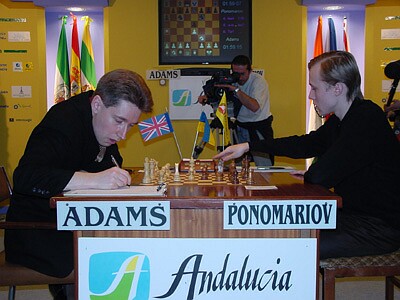
Mickey Adam vs. Ruslan Ponomariov
The 16th century Spanish priest Ruy Lopez de Segura, the first real superstar of chess, strongly advocated in his 1561 ‘Libro del Ajederez’ the opening which bears his name – one of the most famous openings in chess. The British and Americans know it as the Ruy Lopez; however in Europe they are more likely to call it the Spanish Opening.
It was first mentioned in the Göttingen manuscript of 1490; however Lopez was the first to treat this opening systematically. As in today’s game, white consistently applies pressure to black's e-pawn and black must patiently defend, hence Savielly Tartakower, famed for his witty epigrams, wryly referring to it in the 1930s as the Spanish Torture – a nickname that soon stuck.
Round 2: Adams 1-0 Ponomariov; Vallejo draw Anand; Shirov draw Ivanchuk. Bye: Kasparov.
Leader board: 1-5 M Adams (England), V Anand (India), R Ponomariov (Ukraine), A Shirov (Spain), Vallejo (Spain) 1/2; 6-7 G Kasparov (Russia), V Ivanchuk (Ukraine) 0.5
M Adams – R Ponomariov
Ciudad de Linares (2), Ruy Lopez
1 e4 e5 2 Nf3 Nc6 3 Bb5 a6 4 Ba4 Nf6 5 0-0 Be7 6 Re1 b5 7 Bb3 d6 8 c3 0-0 9 h3 Re8 10 d4 Bb7 11 Nbd2 Bf8 12 d5 Nb8 13 Nf1 Nbd7 14 N3h2 Nc5 15 Bc2 c6 16 b4 Ncd7 17 dxc6 Bxc6 18 Bg5 h6 19 Bxf6 Nxf6 20 Ng4 Nxg4 21 Qxg4 d5 22 exd5 Qxd5 23 Bb3 Qd8 24 Qh5 Ra7 25 Rxe5 Rxe5 26 Qxe5 Qg5 27 Qxg5 hxg5 28 Ne3 g6 29 Rd1 Rc7 30 Kf1 Kg7 31 Ke2 Be7 32 Bd5 Bd7 33 Rd3 Bf6 34 c4 bxc4 35 Bxc4 Bc8 36 a3 Bb2 37 Kd2 f5 38 Kc2 Bxa3 39 Rxa3 f4 40 Kb3 fxe3 41 fxe3 Re7 42 Ka4 Re5 43 Rd3 Bf5 44 Rd2 Rxe3 45 Bxa6 Be4 46 Rf2 Kh6 47 Bf1 g4 48 hxg4 Re1 49 Be2 Ra1+ 50 Kb3 Rb1+ 51 Kc3 Rc1+ 52 Kd4 Bb7 53 Bf3 Ba6 54 Rb2 Bb5 55 Be2 Bc6 56 Bf3 Bb5 57 Be2 Bc6 58 Ba6 Rg1 59 b5 Bxg2 60 b6 Kg5 61 Bc8 Kf4 62 Kc5 Be4 63 Rb4 Ke5 64 b7 Rc1+ 65 Kb5 Bxb7 66 Bxb7 Kf6 67 Rc4 Rb1+ 68 Kc6 Kg5 69 Bc8 Rd1 70 Bd7 Kh4 71 Kc7 Rd2 72 Kd8 Re2 73 Rc6 g5 74 Bf5 Re3 75 Re6 Rg3 76 Rh6# 1-0
view the game online download game (pgn)
25 February 2002
UKRAINIAN TEENAGE sensation Ruslan Ponomariov, 18, the new Fide World Champion, has defied his critics with a winning start to the Ciudad de Linares “supertourneo” in Spain.
Ponomariov's reign as Champion began in controversy, as he got involved in a protracted war of words with the organisers of the elite Linares tournament, who in turn threatened to sue the teenager for $1m, blacklist him from future events and tell the world that he was a coward, after Ponomariov suddenly withdrew from Linares after winning the title last month in Moscow.
The mayor of Linares, Juan Fernandez, led a peace-seeking delegation to Moscow and a face-saving deal between the two parties was soon agreed that guaranteed Ponomariov an invitation to next year’s event. However, Ponomariov’s invitation also came under attack by the world number one Garry Kasparov (who sees the threat and was psyching him out early), and the man he beat in the Fide final, Vassily Ivanchuk.
Ivanchuk, who lost heavily in their title match, claimed he [Ponomariov] only won due to the fast Fide time-controls, and it would be a different story at the slow rate of Linares. Those words soon came back to haunt Ivanchuk when the two Ukrainians found themselves facing each other in the opening round at Linares – where yet again Ponomariov outplayed his fellow compatriot.
And, with Kasparov conceding a draw to the unknown Spanish teenager Franco Vallejo Pons, and Vishy Anand drawing with Alexei Shirov, it’s Ponomariov who takes the early lead at Linares.
R Ponomariov – V Ivanchuk
Ciudad de Linares (1), French Defence
1 e4 e6 2 d4 d5 3 Nc3 Bb4 4 e5 c5 5 a3 Bxc3+ 6 bxc3 Ne7 7 Qg4 0–0 8 Bd3 f5 9 exf6 Rxf6 10 Bg5 Rf7 11 Qh5 g6 12 Qd1 Nbc6 13 Nf3 Qf8 14 0–0 c4 15 Be2 h6 16 Bc1 Bd7 17 Ne1 g5 18 g3 Nf5 19 Ng2 Qg7 20 f4 Nd6 21 Qe1 b5 22 fxg5 Rxf1+ 23 Bxf1 hxg5 24 Ne3 Rf8 25 Bg2 a5 26 Bd2 Qg6 27 Ng4 Rf5 28 Qe3 Kg7 29 Rb1 Kh7 30 a4 bxa4 31 Bc1 Rf7 32 Ba3 Qxc2 33 Rc1 Qf5 34 Bh3 Ne4 35 Ne5 Qf2+ 36 Qxf2 Rxf2 37 Nxd7 Ra2 38 Bc5 Nd2 39 Bg2 a3 40 Nf8+ Kh6 41 Re1 e5 42 dxe5 g4 43 e6 Nf3+ 44 Bxf3 gxf3 45 Kf1 1–0
view the game online download game (pgn)
22 February 2002
EVER since its introduction in 1970, the Elo list has been the only authoritative guide for the ratings and standings of all chessplayers.
Yet, despite the rapid development in the last decade or so with computers and software, our little silicon friends are banned from appearing on this list. However, they do have an equally authoritative list produced by the Swedish Chess Computer Association (SSDF).
Over the past ten years or so, the SSDF, a truly independent organisation, has produced the machine version of the Elo list – their latest list published just last week. Number crunching all the data from 84,193 games played by 235 computers, the new leader on the list is Shredder 6.0, the reigning World Computer Champion, created by Germany’s Stefan Meyer-Kahlen for the ChessBase stable.
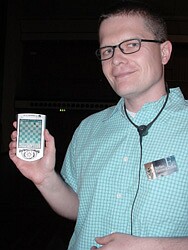
Stefan Meyer-Kahlen
Despite winning the world title on several occasions, this is the first time that Meyer-Kahlen has seen his Shredder program top the list - jumping a massive 54 points to 2715 from its previous incarnation, Shredder 5.32.
SSDF top-ten: 1 Shredder 6.0 2715; 2 Chess Tiger 14.0 2712; 3 Deep Fritz 2708; 4 Gambit Tiger 2.0 2706; 5 Junior 7.0 2682; 6 Rebel Century 4.0 2675; 7 Shredder 5.32 2661; 8 Deep Fritz (128MB K6-2 450 MHz) 2657; 9 Gandalf 4.32h 2648; 10 Gambit Tiger 2.0 2643.
Recently 46 of the top software packages took part in an online tournament hosted by the Internet Chess Club. Playing on dual processor machines, Shredder’s rival, Junior 7, won with a final score of 9/11; Shredder coming second a half point behind on 8.5.
Deep Junior 7- Deep Shredder 6
Internet Chess Club (6), Queen's Gambit Declined
1 d4 Nf6 2 c4 e6 3 Nf3 d5 4 Nc3 Be7 5 Bg5 h6 6 Bxf6 Bxf6 7 e3 c6 8 Be2 0–0 9 0–0 b6 10 a3 Bb7 11 Qc2 Nd7 12 e4 c5 13 e5 Be7 14 cxd5 cxd4 15 dxe6 dxc3 16 exf7+ Kh8 17 Rad1 Qc7 18 e6 Nc5 19 Qxc3 Qc6 20 Qc4 Bf6 21 e7 Bxe7 22 b4 Ne6 23 Qxc6 Bxc6 24 Ne5 Nf4 25 Bc4 Bxg2 26 Rfe1 Bh3 27 Rd4 g5 28 Rxf4 gxf4 29 Ng6+ Kg7 30 Nxe7 Rxf7 31 Kh1 Rff8 32 f3 Rad8 33 Rg1+ Kf6 34 Nd5+ Ke5 35 Rd1 b5 36 Re1+ Kd6 37 Bb3 Be6 38 Rd1 Bxd5 39 Rxd5+ Kc6 40 Rh5 Rf6 41 Rc5+ Kb6 42 Bd5 a5 43 Kg2 Rdd6 44 Be4 axb4 45 axb4 Rd4 46 h4 0–1
view the game online download game (pgn)
AFTER the hurly-burly of two of the world’s largest Opens in France and Moscow (Cappelle le Grande and the Aeroflot Open), the canny Danes opted for the more sedate alternative of organising two ten-player Closed tournaments in parallel to each other - albeit in two very diverse locations of Denmark: the Island of Mors and Copenhagen.
The hilly terrain of Mors, just off the north-west of Jutland, played host to the very first Grandmaster event to take place on the island, and at a category 10 it was the stronger of the two tournaments. The early front-runner was the Czech IM David Navara who was on the hunt for a GM norm. However, the Russian top seed Alexander Rustemov caught up with him midway through the tournament - both going on to share first on 6/9; Navara gaining his second GM norm for his performance.
Final placings: 1 IM D Narvana (Czech), GM A Rustemov (Russia) 6/9; 3 IM A Sokolov (Latvia) 5.5; 4-5 IM K Berg, IM S Pederson (both Denmark) 5; 6 GM L Aronian (Armenia) 4.5; 7-8 J Pederson (Denmark), GM N Miezes (Latvia) 4; 9 IM M Prusikhin (Germany) 3; 10 IM E Pederssen (Denmark) 2.
Meanwhile, in the mainland Danish capital, which is no stranger to GM events, the Copenhagen Chess Club ran a category 9 tournament to celebrate the 75th anniversary of the Copenhagen Chess Union. Likewise, this tournament also ended in a two-way tie, with the Copenhagen-based American GM Nick de Firmian sharing first place on 5.5/9 with English GM (and Sicilian Dragon guru) Chris Ward.
 |
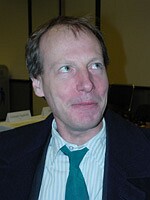 |
|
Chris Ward |
Nick de Firmian |
Final placings: 1-2 GM C Ward (England), GM N de Firmian (USA) 5.5/9; 3-5 GM J Hector (Sweden), GM L Shandroff (Denmark), GM E Gausel (Norway) 5; 6 GM B Brinck-Claussen (Denmark) 4.5; 7-8 GM G Hoi, IM O Jakobsen (both Denmark) 4; 9 IM E Mortenson (Denmark) 3.5; 10 IM B Kristensen (Denmark) 3.
J Hector – C Ward
75th KSU Copenhagen (6), Sicilian Dragon
1 Nc3 c5 2 Nf3 Nc6 3 d4 cxd4 4 Nxd4 g6 5 e4 Bg7 6 Be3 Nf6 7 Bc4 d6 8 h30–0 9 Bb3 Na5 10 f4 b6 11 e5 Nh5 12 Bd5 dxe5 13 fxe5 Ba6 14 Qf3 Rc8 15 0–0–0 Rxc3 16 bxc3 Qc8 17 Nc6 Nxc6 18 Bxc6 Ng3 19 Qxg3 Qxc6 20 Bf4 Bc4 21 Rd4 Bxa2 22 Rhd1 e6 23 Rd7 Qa4 24 R1d6 Bd5 25 Rd8 Be4 26 Qf2 Qa1+ 27 Kd2 Bxc2 28 Rxf8+ Bxf8 29 Rd8 Qd1+ 30 Ke3 Qxd8 31 Qxc2 Qd5 32 Kf2 h6 33 h4 b5 34 Kg3 a5 35 Qf2 Bg7 36 Qe3 a4 37 Kh3 a3 38 Qa7 a2 39 Qb8+ Kh7 40 Qa7 Qc4 0–1
view the game online download game (pgn)
DESPITE being the birthplace of chess (reputedly somewhere around AD600 in the guise of chaturanga, the earliest precursor of the modern game as we know it), India had a long wait before Manuel Aaron became their first International Master in 1961.
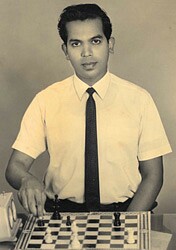
Manuel Aaron
Now, due to the chess boom created with the remarkable rise and feats of their undisputed number one Vishy Anand, who in 1987 became their first Grandmaster, the game is once again “coming home” as India builds its way up to becoming a major chess superpower.

Vishy Anand
During the last Olympiad in Istanbul, a young Indian team (minus Anand) claimed a very creditable eighth place. Later this year at the Bled Olympiad in Slovenia, many believe that the inclusion of Anand could make India serious contenders for the Hamilton-Russell Cup.
Apart from Anand, due to his playing demands on the elite circuit, in order to qualify for the six-man Indian Olympiad squad you have to play in their national championship - and in stark contrast to the modern trend for short tournaments, this one is a veritable test of endurance with a twenty-player all-play-all lasting twenty days!
The 39th edition of the Indian Championship took place in Nagpur from 16 January to 4 February. And, much like the Hastings Premier that immediately preceded it, the personal duel between young rising stars Krishnan Sasikiran, 21, and Panteala Harikrishna, 15, continued through to this tournament.
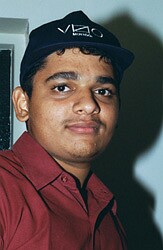 |
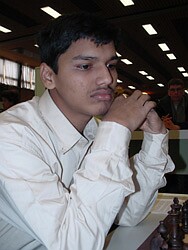 |
|
Krishnan Sasikiran |
Panteala Harikrishna |
It was these two who battled it out throughout the tournament with Sasikiran coming out on top after he had won in their individual game below – an epic 125-mover that ended Harikrishna's run of 32 games without defeat; and Harikrishna also slipped up in the penultimate round with a shock defeat to IM R B Ramesh.
Sasikiran, who was runner up in 2000 and 2001 and who last won the title in 1999, therefore took the 2002 Championship with a final score of 14.5/19, just a half point behind Harikrishna. Thus ending a remarkable period months for Sasikiran, who for the first time in his career had won three successive tournaments in as many months: the AICF Golden Jubilee title at Kozhikode in December and jointly claiming the Hastings Premier in January with Harikrishna and Barsov.
The final top scores were therefore Sasikiran 14.5/19, Harikrishna 14, IM S.S Ganguly 13, GM Dibyendu Barua 12.5 and GM Abhijit Kunte 11, Ramesh made 10.5. The first five therefore are selected for the Indian National squad for Bled; and Ramesh, should Anand again decline his top board place, being the first reserve.
V Sareen – K Sasikiran
39th Indian Ch. (6), King’s Indian Defence
1 d4 Nf6 2 Nf3 g6 3 g3 Bg7 4 c4 0–0 5 Bg2 d6 6 0–0 Nbd7 7 Nc3 e5 8 e4 a6 9 h3 exd4 10 Nxd4 Rb8 11 a4 Re8 12 Re1 c6 13 Bf4 Ne5 14 b3 a5 15 Qc2 Qc7 16 Rad1 b6 17 Bc1 Bb7 18 f4 Ned7 19 Ndb5 cxb5 20 Nxb5 Qc6 21 Nxd6 Nc5 22 Nxb7 Qxb7 23 e5 Qe7 24 exf6 Qxe1+ 25 Rxe1 Rxe1+ 26 Kh2 Bxf6 27 Bf3 Rbe8 28 Bd2 R8e2+ 29 Bxe2 Rxe2+ 30 Kg1 Bd4+ 31 Kf1 Rf2+ 32 Ke1 Be3 0–1
view the game online download game (pgn)
IT was a case of “who dares wins” in the final round of the Cappelle la Grande Open in northern France, as the Lithuanian GM Eduardas Rozentalis became the first player in recent years to win the tournament outright.
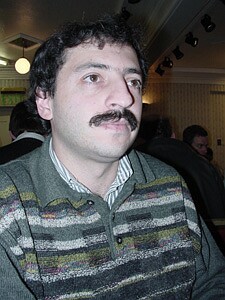
Eduardas Rozentalis
Since 1982, the little Normandy coastal town close to Dunkirk has organized one of the world’s largest events on the international calendar. However, with so many GMs each year in the field as it grew in popularity (this year 678 players from over 55 countries with nearly 70 GMs), an outright winner has proved to be elusive – the title being shared the last three years.
Going into the final round this year, the 19th edition of the tournament, Rozentalis defeated the overnight leader, Vasilios Kotronias, to take the title and outright first with his winning score of 7.5/9.
Also for the third successive year at Cappelle, the top Scot (on overall performance) was Kilmarnock’s John Shaw – who going into the final round found himself in contention for a major prize with an unbeaten score of 6/8. Unfortunately, his run ended abruptly at the hands of the highly rated second seed Vladimir Baklan, who needed victory for second equal. Shaw finished in 48th place on 6/9, with Colin McNab, on the same score, finishing in 74th place.
Other leading Scottish scores: 120 Tim Upton 5.5; 220-221 Alan Minnican and Paul Roberts 5; 230 Ian Gourlay 5; 327 Mike Shepherd 4.5.
Final standings: 1 E Rozentalis 7.5/9; 2-12 V Neverov, V Baklan, A Kveinys, V Kontronias, T Luther, L Nisipeanu, J Noguerias, A Leisiege, R Kalod, L Winants , J Sprenger 7.
E Rozentalis – V Kotronias
Cappelle la Grande (9), Sicilian Rossolimo
1 e4 c5 2 Nf3 Nc6 3 Bb5 e6 4 Bxc6 bxc6 5 0–0 Ne7 6 d3 Ng6 7 Qe2 e5 8 c3 Ba6 9 a3 Bd6 10 b4 0–0 11 Be3 f5 12 Nbd2 f4 13 Bxc5 Bxc5 14 bxc5 Qa5 15 c4 Qxc5 16 Nb3 Qe7 17 Qd2 Rab8 18 Rfb1 d6 19 Qa5 Bc8 20 h3 c5 21 Nbd2 Be6 22 Rxb8 Rxb8 23 Rb1 Rxb1+ 24 Nxb1 h6 25 Qa6 Nh8 26 Nc3 Nf7 27 Qc6 Kh7 28 Nd5 Bxd5 29 cxd5 Qd8 30 Qb7 Ng5 31 Qxa7 c4 32 dxc4 Nxe4 33 Qf7 Nc5 34 h4 Kh8 35 h5 Nd3 36 a4 Nc5 37 a5 Qxa5 38 Qf8+ Kh7 39 Qxd6 e4 40 Nh4 Qa1+ 41 Kh2 Qa5 42 Kg1 e3 (43 Qg6+ Kg8 44 Qe8+ Kh7 45 Ng6 exf2+ 46 Kh2 f1N+ 47 Kg1 mates) 1–0
view the game online download game (pgn)
GRANDMASTER Edmar Mednis, the man who made a name for himself by literally teaching the world how to beat Bobby Fischer, died suddenly last week (13 Feb) of pneumonia at the age of 64, brought on by complications after minor surgery, at his home in Queens, New York.
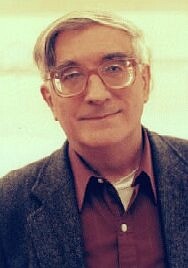
Edmar Mednis
Edmar John Mednis was born in Riga, Latvia on March 22, 1937. He escaped from Latvia in 1944 along with his parents at the end of the Second World War and, after a spell in a displaced persons camp in Germany, they settled in America.
Despite his popularity in the chess world, Mednis wasn’t a very successful chess player – despite the promising start which was probably the highlight of his career. He represented the United States in the 1955 World Junior Championship in Antwerp, Belgium, were he second behind Boris Spassky (drawing their individual game), and ahead of Lajos Portisch.
Mednis was a frequent participant in the U.S. invitational championship with his best result being a tie for third in the 1961-62 tournament - this during a golden era when Fischer single-handedly dominated the U.S. game. The following year, he caused a major upset (and his best individual result) when he beat Fischer in the opening round of the U.S. Championship – the first person to do so in any U.S. event since Robert Byrne in 1957.
Ironically it was the Fischer boom of the early 1970s that brought Mednis to the attention of the American public and to chess players worldwide. He became an instant hit on PBS TV with his almost nightly colourful commentaries of the 1972 World Championship match between Fischer and Spassky.
Yet, despite having a poor 1.5-5.5 record against Fischer, Mednis suddenly became famous as an authority on Fischer’s weaknesses at the board when he dissected all of his lost games to write his 1974 classic, How To Beat Bobby Fischer, which became an instant hit worldwide. Using the same winning formula, he later followed the book up in 1975 when Fischer abdicated with a book on the new world champion, entitled How Karpov Wins.
It was through these pioneering books that Mednis found his niche in the chess world as a distinguished writer and teacher of the game. More books followed, particularly in the endgame where he became an expert at explaining a difficult and often neglected branch of the game so clearly.
He wrote many books and articles on the chess ending, and his monthly column for Chess Life, “The Practical Endgame”, was syndicated to many chess magazines. Some of his best works, including From the Opening to the Endgame and From the Middlegame to the Endgame, dealt with how to reach a favourable endgame and were praised by no less an authority than leading chess trainer Mark Dvoretsky.
In recognition of his significant contribution to American chess through his ground breaking teaching and writing, two years ago Mednis was inducted into the US Chess Hall of Fame (www.chesslinks.org/hof) at a ceremony in Washington, DC.
It was thanks to his one and only defeat of Fischer however that Mednis first thought about writing his famous book on the wayward American genius. In it, he comments: I have been asked innumerable times how it felt to receive Fischer's handshake. Well, it sure felt great to defeat Fischer, but I must admit that I didn't get Bobby's handshake nor, for that matter, any other direct communication from him. What happened was the following: Next time we were together was for Round 4, and before the games for that round started, Fischer went up to the referee, Hans Kmoch, and told him that he was resigning. Mr. Kmoch then came over to me and informed me, "Mr. Fischer has resigned."
R Fischer – E Mednis
US Championship 1962, French Defence
1 e4 e6 2 d4 d5 3 Nc3 Bb4 4 e5 c5 5 a3 Bxc3+ 6 bxc3 Qc7 7 Nf3 Bd7 8 a4 Ne7 9 Bd3 Nbc6 10 0–0 c4 11 Be2 f6 12 Ba3 0–0 13 Re1 Rf7 14 exf6 gxf6 15 Bf1 Re8 16 Nh4 Ng6 17 Qh5 Rg7 18 g3 Qa5 19 Bb2 Nd8 20 Re3 Nf7 21 Kh1 Nd6 22 Nxg6 hxg6 23 Qe2 Rh7 24 Kg1 Kf7 25 h4 f5 26 Qf3 Ne4 27 Qf4 Rc8 28 Bg2 Qc7 29 Qxc7 Rxc7 30 a5 Rc6 31 Ba3 Ra6 32 Bb4 Rh8 33 Ree1 Bc6 34 Bf3 Nd2 35 Be2 Ne4 36 Kg2 Nf6 37 Rh1 Be8 38 Kf3 Ne4 39 Ke3 Nf6 40 f3 Bd7 41 g4 Be8 42 Kf4 Bb5 43 h5 gxh5 44 Rag1 Be8 45 Ke3 b6 46 axb6 Rxb6 47 Ra1 Rb7 48 Bd6 Rh7 49 gxf5 exf5 50 Rh4 Ke6 51 Bh2 Rb2 52 Kd2 Rhb7 53 Kc1 R2b6 54 Bf1 Ng8 55 Bf4 a5 56 Rh2 a4 57 Bh3 Ne7 58 Bg5 Kf7 59 Re2 Re6 60 Rxe6 Kxe6 61 Kd1 Nc8 62 Kd2 Bd7 63 Bg2 Ra7 64 Re1+ Kd6 65 Bh6 a3 66 Bf8+ Kc6 67 Bc5 Ra8 68 Ra1 a2 69 Ke3 Nd6 70 Kf4 Nb5 71 Bb4 h4 72 Bh3 Nc7 73 Be7 0–1
view the game online download game (pgn)
FEBRUARY in the chess world can only mean “the Dunkirk spirit”, as a large British contingent cross the channel to compete at the ever-popular Cappelle la Grande Open in northern France.
The little Normandy coastal town, close to an evocative name in British history, only has a population of around 9,000 but each year, due to an enthusiastic Communist mayor and a local community spirit that welcomes the players with open arms, it plays host to one of the world’s largest events on the international calendar.
This year, due to the clash of dates with the Aeroflot Open in Moscow that deprived the French organizers of several Russian GMs who would invariably have made the annual pilgrimage, the 18th edition of the tournament had reduced numbers than the year previous. However, despite the small drop in the numbers, the festival this year attracted a staggering total of 678 players from 56 countries; including 66 GMs and 70 International Masters, of these, five are rated 2600 or over and a further 40 over 2500.
With such a huge field and so many strong players in the competition, it is hard to get up amongst the leaders as Opens of this stature are paired in such a way to cull the numbers on a maximum score.
After six rounds, there’s a ten-way tie for first on 5/6. The top Scottish
player in Cappelle is again Kilmarnock’s John Shaw, who’s still
looking for that illusive first GM norm. Unbeaten so far at the half way
stage, he finds himself in a large chasing pack of 41(!), just a half point
behind on 4.5/6.

John Shaw
Leader board: 1-10 GM V Burmakin (Rus), GM J Dagraeve (Fra), GM V Neverov (Ukr), GM V Kotronias (Cyp), GM A Kveinys (Ltu), GM S Movsesian (Cze), IM D Gormally (Eng), IM J Sprenger (Ger), GM S Zagrebeleny (Uzb), GM A Shneider (Ukr) 5/6.
J Shaw – C Paci
Cappelle la Grande (5), French Tarrasch
1 e4 e6 2 d4 d5 3 Nd2 c5 4 exd5 Qxd5 5 Ngf3 cxd4 6 Bc4 Qd6 7 0–0 Nf6 8 Nb3 Nc6 9 Nbxd4 Nxd4 10 Nxd4 a6 11 Bd3 Qc7 12 Qe2 Bd6 13 Nf5 Bxh2+ 14 Kh1 Kf8 15 Nxg7 Kxg7 16 g3 h5 17 Bf4 Qc6+ 18 Kxh2 Ng4+ 19 Kg1 e5 20 Bxe5+ f6 21 Bc3 Re8 22 Qd2 Qd5 23 Rfe1 Bd7 24 Be4 Qf7 25 Qg5+ Kh8 26 Bd5 Be6 27 Bxe6 Rxe6 28 Rxe6 Qxe6 29 Qxh5+ Kg7 30 Re1 Qd7 31 f3 1–0
view the game online download game (pgn)
2002-02-14
ON sheer playing strength alone, the highlight of the year on the elite circuit has invariably been the Linares tournament – now boosted to a category 20 once again with the re-entry of Ruslan Ponomariov.
However, this year the Spanish super-tournament is set to be eclipsed by a star-studded line-up in the Kazakhstan capital with a second edition of the Astana super-tournament, held under the patronage of the Kazakh president, Nursultan Nazarbayev.
Running from May 27 – 8 June, the field for the double-round robin includes the top four players in the world, Garry Kasparov, Vladimir Kramnik, Vishy Anand and Michael Adams, plus world number six Veselin Topalov and local hero Darmen Sadvakasov, the 1998 world junior champion.
As if this wasn’t enough competition for Linares, who since 1981 have prided themselves on being the “Wimbledon of Chess”, the Spanish super-tournament now has to compete with a rival category 18 competition running during the same period (February 22-3 March) in Cannes. The Nao Masters features a line-up that includes Alexander Morozevich, Veselin Topalov, Peter Leko, Boris Gelfand, Evgeny Bareev, Anatoly Karpov and French stars Joel Lautier, Etienne Bacrot, Laurent Fressinet and Igor Nataf.
All of which makes for a fun time at the Fantasy Chess site (http://play.at/fantasychess), where you can try and predict the results of the above tournaments, and many more in their year-long Grand Prix. Last year’s 2001 Grand Prix winner was Norway’s Oystein Hole who took the honours with an impressive final tally of 388, just 12 off a maximum of 400.
V Milov – V Tkachiev
Aeroflot Open (9), Pirc Defence
1 d4 d6 2 g3 Nf6 3 Bg2 g6 4 e4 Bg7 5 Ne2 0–0 6 0–0 Nbd7 7 a4 Rb8 8 h3 c5 9 d5 a6 10 a5 b5 11 axb6 Nxb6 12 Nbc3 a5 13 g4 a4 14 Ng3 Nfd7 15 Ra2 Ra8 16 Nb1 Ne5 17 Re1 e6 18 Nd2 exd5 19 exd5 Bb7 20 Ndf1 Re8 21 Ne3 Nec4 22 Nxc4 Rxe1+ 23 Qxe1 Nxc4 24 Qe4 Nb6 25 c4 Qd7 26 Qc2 Ba6 27 Bf1 Rb8 28 Ra3 Bd4 29 Rf3 Qe7 30 Kg2 Bc8 31 Ne2 Be5 32 Re3 Ba6 33 Ng3 Qd8 34 Ne4 Bd4 35 Rf3 f6 36 Bf4 Nxd5 37 cxd5 Rxb2 38 Qxa4 Bb7 39 Bxd6 Rb4 40 Qd1 Bxd5 41 Bxc5 Bxc5 42 Qxd5+ 1–0
view the game online download game (pgn)
2002-02-13
IN a tense, last round struggle at the Aeroflot Open in Moscow, a pre-arranged eight move draw between two ex-Soviet American GMs proved decisive in the destination of the top prize.
With a wealth of experience behind them in the notoriously tough US circuit,
a final round draw on the top board between Gregory Kaidanov, formerly from
the Ukraine, and former Latvian Alexander Shabalov proved to be a shrewd
move as it left the pair in the club house as early leaders.

Gregory Kaidanov
It was inevitable that there would be a lot of draws on the top boards in the last round due to the overall strength of the tournament. And indeed of the top eight boards, six proved to be drawn – including that of joint overnight leader Alexander Grischuk, who drew with Alexey Dreev - with the only wins coming from Aleksej Aleksandrov and Vadim Milov.
So, in a five-way split for first, Kaidanov took the first place and the title on tiebreak from Shabalov, Grischuk (Russia), Aleksandrov (Belarus) and Milov (Switzerland), all on the relatively low score of 6.5/9. However, unlike other large European Open tournaments, the prize money in the Aeroflot Open wasn’t split five ways – Kaidanov therefore taking back to his adopted home of Lexington, Kentucky the top prize of $18,050; Grischuk $11,550, Aleksandrov $9,300, Shabalov $8,550, Milov $8,050.
Ironically, one of the main reasons for the Soviet GM exodus to America was for financial reason after the collapse of Communism which led to the removal of state aid for the many chessplayers who earned their living from the game. Now, due to this new tournament with a massive prize fund and subsidised air travel sponsored by Aeroflot, the former Soviets are going back home to Mother Russia, where the average monthly wage is only $200, to pick up the big bucks!
V Yemelin – G Kaidanov
Aeroflot Open (8), Spanish Opening
1 e4 e5 2 Nf3 Nc6 3 Bb5 a6 4 Ba4 Nf6 5 0–0 b5 6 Bb3 Bb7 7 Re1 Bc5 8 c3 d6 9 d4 Bb6 10 Be3 0–0 11 Nbd2 h6 12 d5 Ne7 13 Bxb6 cxb6 14 Nf1 Bc8 15 Bc2 Ne8 16 Ne3 Ra7 17 Qd3 g6 18 Nd2 f5 19 exf5 gxf5 20 g3 Ng6 21 Ng2 Rg7 22 Kh1 Nf6 23 f4 exf4 24 Nxf4 Nxf4 25 gxf4 Ng4 26 Re2 Qh4 27 Qd4 Kh7 28 Rg1 Rfg8 29 Rf1 Re8 30 Rg2 Rge7 31 Rfg1 Re2 32 Nf1 Rxg2 33 Rxg2 Re1 34 Kg1 Qh3 35 Qd2 Ne3 0–1
view the game online download game (pgn)
IT’S a typical piece of Linares negotiations: first come the heavy-handed
threats a la legendary Linares organizer Don Luis Rentero, only to be followed
by the sweet-talking behind the scenes that actually gets the results.
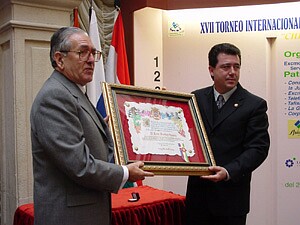
Don Luis Rentero and the mayor of Linares, Juan Fernandez, at the
opening of Linares 2000
After bullying new Fide World Champion Ruslan Ponomariov with the threat of a $1 million law suit and accusing the teenager of “cowardice” after pulling out of Linares, Juan Fernandez, the mayor of Linares, immediately flew to the Aeroflot Open in Moscow to broker a compromise deal with representatives of the new world champion, in a last-minute bid to see him play in the tournament.
Compromises were made on both sides, with Fernandez and the Linares delegation now agreeing terms for a two-year deal that will see Ponomariov, the hottest property in chess today, play in the Ciudad de Linares tournaments of 2002 and 2003.
This will be the ultimate test for the Ukrainian youngster as he makes his debut in his very first super-tournament, regarded as the “Wimbledon of Chess”. It will also mean a high-profile first showdown with world number one Garry Kasparov, the player Ponomariov was being accused of being afraid to play so soon after winning his world title.
The new line up, with world rankings in brackets, will be: Kasparov (1), Vishy Anand (3), Michael Adams (4), Ponomariov (8), Vassily Ivanchuk (9), Alexei Shirov (10), Francisco Vallejo Pons (61). The seven-player double-round all-play-all starts on February 22, with one player sitting out each round.
And, just in case the negotiations had floundered in Moscow, Ponomariov was going to be replaced by another teenager, Alexander Grischuk, who takes the joint lead in the Aeroflot Open going into the final round.
A Grischuk – K Miton
Aeroflot Open (1), Sicilian Rossolimo
1 e4 c5 2 Nf3 Nc6 3 Bb5 d6 4 0–0 Bd7 5 Re1 a6 6 Bxc6 Bxc6 7 d4 cxd4 8 Nxd4 Nf6 9 Nxc6 bxc6 10 Qf3 Qc7 11 b3 e5 12 Nd2 Be7 13 Nc4 0–0 14 Bg5 d5 15 exd5 cxd5 16 Bxf6 dxc4 17 Bxe5 Bd6 18 Qg3 Bxe5 19 Qxe5 Qc6 20 Rad1 cxb3 21 cxb3 a5 22 Qe4 Qb5 23 Rd5 Qb6 24 Qd4 Qc6 25 h4 h6 26 Re3 Rfe8 27 Rg3 g6 28 h5 Re1+ 29 Kh2 Qc1 30 Rc3 Rh1+ 1–0
view the game online download game (pgn)
IT looks as if chess is finally coming home to Moscow. Following the Fide World Championship and the Botvinnik Memorial with Kasparov and Kramnik staged there late last year, we now have one of the strongest Open Swisses of all time underway in the Russian capital.
The GMs turned up in their droves to the Hotel Rossija by the Kremlin, which with 2876 rooms is the largest hotel in Europe, for the first Aeroflot Open sponsored by the Russian airline - and little wonder with the added attraction of a $150,000 prize fund, split over three sections.
With over 400 players taking part, 82 of which are grandmasters, the strength of the event is such that the second tournament is restricted to players rated below 2450! The top section of 132 players is headed by Ilya Smirin (Israel) rated 2702, Dutchman Loek Van Wely (2697) and Russian Alexei Dreev (2683) plus a further 17 players over 2600.
Such is the strength of the event that the traditional opening round pairings which sees “top half vs. bottom half” resulted in losses for all three top seeds: Smirin, Dreev and not to mention the hapless Van Wely, who continues on his disastrous form from Wijk aan Zee with a sparkling loss to blast from the past Evgeny Vasiukov, who at 69 is the tournament veteran.
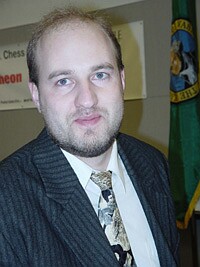 |
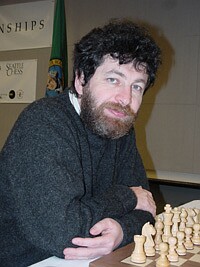 |
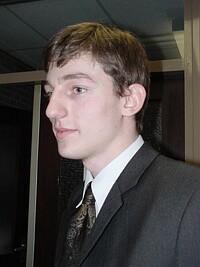 |
Shabalov, Kaidanov and Grischuk - joint-leaders in the Aeroflot
Open
Going into the decisive final rounds, the U.S. duo of Gregory Kaidanov and Alexander Shabalov, two former Russian émigrés with a wealth of experience on the notoriously tough U.S. Open circuit, shares the lead on 6/8 with top Russian teenager Alexander Grischuk. Ominously, however, just a half point behind them they have a formidable chasing pack of 13 hungry GMs on their tails.
E Vasiukov – L Van Wely
Aeroflot Open (1), Sicilian Defence
1 e4 c5 2 Nf3 d6 3 d4 cxd4 4 Qxd4 Nc6 5 Bb5 Bd7 6 Bxc6 Bxc6 7 Nc3 Nf6 8 Bg5 e6 9 0–0–0 Be7 10 Rhe1 0–0 11 Kb1 Qa5 12 Qd2 Qa6 13 Nd4 Rfc8 14 f4 h6 15 h4 Qc4 16 g4 Kf8 17 f5 hxg5 18 hxg5 Nd7 19 fxe6 Ne5 20 Rh1 fxe6 21 b3 Qb4 22 Rh8+ Kf7 23 Qf4+ Bf6 24 Rh7 Kg8 25 gxf6 Kxh7 26 Qg5 Rc7 27 Nxe6 Rac8 28 fxg7 Kg8 29 Rh1 Bxe4 30 Rh8+ Kf7 31 Nxc7 Qxc3 32 g8Q+ 1–0
view the game online download game (pgn)
2002-02-08
AS chess tournaments go, they don’t come anymore idyllic than an invitation to the annual Chess Festival held on the tropical paradise island of Bermuda, where the motto appears to be “Life’s a beach and then you play some chess”.
Due to the surroundings and legendary hospitality on offer, the festival has become a firm-favourite with many players. As ever, the festival is efficiently organised by the Bermuda Chess Association in the guise of two British expat tax exiles, Nick Faulks and Nigel Freeman, and held this year in the grandiose-sounding Fairmont Southampton Princess Hotel.
Bermuda’s annual Open tournament, which precedes the two Grandmaster 10-player all-play-alls, ended in a three-way tie for first between IM Emanuel Berg, IM Florian Handke and GM Bojan Vuckovic, with the young Swedish IM Berg winning a playoff round-robin 2-0 to take the title and trophy.
Twenty young players from 11 countries (many of whom were in the hunt for title norms) featured in the two Grandmaster events. The GM ‘A’ group, with an average rating of 2500, ended in a three-way tie between the American prodigy Hikaru Nakamura, Norwegian Leif Erlend Johannessen and the talented Brazilian GM Giovanni Vescovi. The trio finished on 6/9, and the result gave IMs Johannessen and Nakamura GM norms.
Slightly weaker with an average rating of 2450, the Grandmaster ‘B’ group ended in an easy victory for Polish GM Pawel Blehm with a winning score of 7.5/9, a full point ahead of Berg, the Swede however having the conciliation of not only winning the Open but also gaining his first GM norm on his North American debut.
Whilst Nakamura now has just over a year for a further two GM norms to break Bobby Fischer’s age-record of becoming a grandmaster, the Norwegian Johannessen is witness that it’s an easy accomplishment. He’s had a fantastic start to the year scoring two GM norms in quick succession. He made his first GM result at Oslo only the day before flying out to Bermuda.
L Johannessen – H Nakamura
GM ‘A’ Bermuda (7), Gruenfeld Defence
1 d4 Nf6 2 c4 g6 3 Nc3 d5 4 cxd5 Nxd5 5 e4 Nxc3 6 bxc3 Bg7 7 Nf3 c5 8 Rb1 0–0 9 Be2 cxd4 10 cxd4 Qa5+ 11 Bd2 Qxa2 12 0–0 Bg4 13 Bg5 Qe6 14 h3 Bxf3 15 Bxf3 Qd7 16 d5 Na6 17 Qe2 Nc5 18 e5 Rae8 19 Rfd1 f6 20 Be3 Rc8 21 d6 b6 22 Bxc5 Rxc5 23 e6 Qc8 24 dxe7 Re8 25 Rd8 Rxd8 26 exd8Q+ Qxd8 27 e7 Qe8 28 Qe6+ Kh8 29 Rd1 Rc8 30 Qxc8 Qxc8 31 Rd8+ 1–0
view the game online download game (pgn)
SINCE Bobby Fischer’s more or less self-imposed retirement from the game after winning the world title in 1972, Americans have been searching for a successor.
The most celebrated is unquestionably Josh Waitzkin, whose rise to the top through the notoriously tough junior competitions to become a leading contender was memorably chronicled by his journalist father, Fred, in his compelling memoir “Searching For Bobby Fischer”; a book that went on to become a Hollywood film starring Joe Mantegna, Max Pomeranc, Joan Allen, Ben Kingsley and Laurence Fishburne.
The latest wunderkind to follow in the footsteps of Fischer is Hikaru Nakamura, 14, from the City of White Plains, New York, who, under the watchful eye of his stepfather and top Sri Lankan coach Sunil Weeramantry, has been a chess prodigy in the making for several years now.
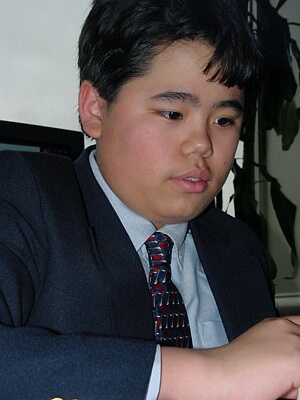
Hikaru Nakamura, the new American chess prodigy
At the age of nine, Nakamura made a chance discovery whilst reading the Guinness Book of World Records that he had only three-months to beat a record by becoming America’s youngest National Master - so decided to do something about it. After breaking this record, he then progressed to become the youngest player in the world (at the age of 11 years, two months) to beat a grandmaster in serious tournament praxis with a victory over Alexander Stripunsky at the 1999 Land of the Sky Open in North Carolina.
Last year Nakamura became the youngest American player to earn the title of International Master. Sadly, at 13 years and 7 months, his win a few months later at the U.S. Junior Championship came just three months shy of Fischer’s record when he won the title in 1956.
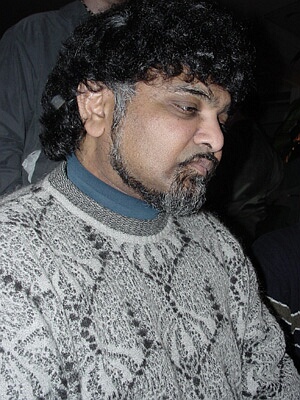
Sunil Weeramantry, Nakamura's trainer
The American prodigy scored the best result of his career last week when he tied for first in the annual Bermuda invitational event. The youngest player in a field that included five grandmasters, not only did he tie for first with a score of 6/9, but the result gave him, at 14, his first grandmaster norm - leaving him just over a year to gain the final two to beat Fischer’s record of becoming a GM.
Nakamura started his campaign in Bermuda by devastating the field with a stunning start of 5/6 – a fantastic run that started off with a brilliant king-hunt against the highly-rated Canadian champion Alexander Lesiege, before taking the scalps of two other top GMs. His sensational run was only halted in the seventh round when he lost to Leif Erlend Johannessen, the Norwegian also gaining a GM norm.
H Nakamura – A Lesiege
GM ‘A’ Bermuda (1), Sicilian Najdorf
1 e4 c5 2 Nc3 d6 3 Nf3 Nf6 4 d4 cxd4 5 Nxd4 a6 6 Be3 e5 7 Nb3 Be6 8 f3 Nbd7 9 Qd2 Be7 10 0–0–0 b5 11 g4 Nb6 12 g5 Nfd7 13 Nd5 Bxd5 14 exd5 Nc4 15 Bxc4 bxc4 16 Na5 c3 17 Qxc3 Bxg5 18 f4 exf4 19 Nc6 Qc7 20 Bd4 f6 21 Rhg1 Bh6 22 Rge1+ Ne5 23 Bxe5 fxe5 24 Rxe5+ dxe5 25 d6 Qd7 26 Nxe5 Qb5 27 d7+ Ke7 28 Qa3+ Ke6 29 Qd6+ Kf5 30 Nf3 Kg4 31 Nd4 Qc4 32 Rg1+ Kh3 33 Qe5 g6 34 Qe4 1–0
view the game online download game (pgn)
WHILST there are several stronger chess nations overall, the champion per capita is unquestionably tiny Iceland, where they’re literally chess-mad. From a population of just 278,000, it supports nine grandmasters – which in comparison would equate to 2000 among the 60 million or so in Britain.
And, with seven Icelandic International Masters also on the list, they are the only country in the world that has more GMs than IMs on their books. Chess is held in such high esteem in the country that it is put on a level with the performing arts and sports with all professional chess players receiving a government state pension to subsidise their chess earnings.
Their most famous player, Fridrik Olafsson, became Iceland’s first grandmaster in 1958. Just a year later, in 1959, he went on to become the first Icelandic player to qualify for a Candidates tournament; scoring wins at Zagreb in the process over giants like Fischer, Keres and Petrosian. Also a politician, he once resigned from a government post to become a professional chess player – which immediately led to his best ever tournament result, finishing equal first with Ljubojevic at Wijk aan Zee 1976.
He then went on to the murky world of chess politics to become the “safe pair of hands” as replacement for Dr Max Euwe as Fide President. However, being an honest politician proved to be his downfall, and his tenure in office was short-lived when he was forced out after just four–years by the ultimate political fixer, Florencio Campomanes. Olafsson decided it was then time to return to domestic politics, where he is now the Speaker of the Icelandic Parliament, the Althing.
A few years ago an opinion poll was commissioned to determine which celebrity Icelanders would most like to spend an evening with. It must have had something to do with those long, cold winter nights but, coming ahead of pop icon Madonna, they opted for the delights of Lancashire’s finest, Nigel Short!
No wonder then that Short, unlike Madonna, always welcomes any visit to Iceland. Last month the former world title challenger took on the present Icelandic champion, Hannes Stefansson, in a six game challenge match (8-13 January) in Reykjavik to celebrate the anniversary of the Hellir Chess Club.
Short, who had difficulties arriving for the start of the match after his Athens home was snowbound in the worst weather for 40 years, got off to the worst possible start as the Icelander took an opening lead of 1.5/2. However, Short soon found his form by scoring four impressive wins in the final four games to take the match 4.5-1.5.
H Stefansson – N Short
VIII Gudmundur Arason (6), French Defence
1 e4 e6 2 d4 d5 3 Nc3 Nf6 4 Bg5 dxe4 5 Nxe4 Be7 6 Nxf6+ Bxf6 7 Bxf6 Qxf6 8 Nf3 0–0 9 c3 Nd7 10 Be2 b6 11 Qa4 a6 12 0–0 Qe7 13 Nd2 Bb7 14 Bf3 Bxf3 15 Nxf3 c5 16 Rad1 b5 17 Qa5 Rfc8 18 Rfe1 cxd4 19 Rxd4 Nc5 20 Ne5 f6 21 Nd3 Na4 22 Nf4 e5 23 Rd2 Qf7 24 Nd5 Nxb2 25 Nxf6+ gxf6 26 Rxb2 Qc7 27 Qxc7 Rxc7 28 Rb3 Kf7 29 Kf1 Rc4 30 Ra3 Ke6 31 Rd1 h5 32 g3 h4 33 Ke2 f5 34 Rd3 f4 35 gxh4 e4 36 Rd1 a5 37 Rb3 b4 38 cxb4 axb4 39 Rd2 f3+ 40 Kd1 Rg8 41 Re3 Ke5 42 h5 Rgc8 43 Ke1 Rc1+ 44 Rd1 R8c3 0–1
view the game online download game (pgn)
THE erratic and often misguided American genius Bobby Fischer is still big news in the game despite the fact that it’s nearly ten years now since he last (officially) played a game - and thirty years since his infamous cold war epic with Boris Spassky at Reykjavik in 1972.
Fearful of imprisonment in the U.S. for various reasons ranging from tax evasion to the breaking of UN sanctions when he made a comeback in 1992 to play Spassky in war-torn Yugoslavia, Fischer has vowed never to return to his homeland, and after spells in Germany and Hungary now lives in Japan.
In the last few years he’s given some unsavoury anti-American and racist interviews on radio in the Philippines. Last week, however, Fischer returned to the scene of his finest hour with a more moderate – well, for Fischer anyway – interview by phone on Icelandic TV alongside his former bodyguard from the 1972 match, Sæmundur Pálsson. Apart from the usual tirade, Fischer announced that he now only plays his new version of the game, Fischer Random, commenting: "I don't play the old chess anymore – it’s been played out". Another bone of contention was Nigel Short’s highly-publicised Internet match last year with “Fischer”, which he strenuously denied.
Fischer may not have played Short in a hoax story that made headlines throughout the world, but at least Short achieved some sort of link to the fallen icon with a recent six-game match in Reykjavik against one of Iceland’s top players, Hannes Stefansson.
Sacrilege some may say, but, for the first time since ‘that’ Fischer-Spassky “Match of the Century”, the actual table, chessboard and chairs (which had to be x-rayed following a complaint from the KGB) used for the showdown, which after the 1972 match became a permanent exhibit in the Reykjavik Museum, were allowed to be used for the first time.
N Short – H Stefansson
VIII Gudmundur Arason (5), Closed Sicilian
1 e4 c5 2 Nc3 Nc6 3 g3 g6 4 Bg2 Bg7 5 d3 d6 6 Be3 Bd7 7 f4 b5 8 a3 Nf6 9 Nf3 0–0 10 h3 Rb8 11 0–0 a5 12 g4 Ne8 13 Rb1 b4 14 axb4 axb4 15 Ne2 Nc7 16 f5 Nb5 17 Qd2 Nbd4 18 Nexd4 Nxd4 19 Bh6 Nxf3+ 20 Rxf3 Ra8 21 Bxg7 Kxg7 22 d4 Qb6 23 e5 dxe5 24 dxe5 Bc6 25 f6+ exf6 26 Rxf6 c4+ 27 Kh2 Rac8 28 Rbf1 Qc5 29 Qf4 Be8 30 h4 Rd8 31 h5 Rd4 32 h6+ Kg8 33 Qe3 Rd5 34 Qxc5 Rxc5 35 e6 Re5 36 Bd5 Rxd5 37 e7 Re5 38 Rxg6+ 1–0
view the game online download game (pgn)
IT’S a case of Einstein a go-go for world champion Vladimir Kramnik, as the beleaguered Brain Games Network finally went out of the chess business in spectacular style under a mountain of debt.
Einstein Group plc, the international multi media group announced recently that it was expanding into the chess world, having cherry-picked the prized assets previously held by BGN plc, the company set up at the height of the dot.com boom who staged the Kasparov-Kramnik title match in London just two-year’s ago.
The new deal gives the Einstein Group a five-year contract with world chess champion, Vladimir Kramnik; all contracts relating to the proposed ‘Brains in Bahrain’ (Man v Machine) match; all rights to the Dortmund Candidates-styled qualifying tournament to determine Kramnik’s next challenger and all arrangements relating to his title defence in 2003.
The group was founded in 1999 and includes a satellite channel on Sky Digital. Steve Timmins, CEO, Einstein Group, believes there is a natural “synergy” between both parties, which hopefully will see the game receiving a higher-profile and greater sponsorship with the television platform provided by the new company.
The move must come as a relief to Kramnik, who has had to watch from the sidelines the demise of BGN as they ran out of money in true dot.com fashion, which has been chronicled with some mirth in the last two issues of the satirical magazine “Private Eye”.
Welcoming the move, Kramnik commented: “We have never seen such a combination between World Chess and a multi media company. This could lift chess into another dimension. The company [Einstein Group] discovered a real niche in the market and hopefully this deal will bring the wonderful and intellectual game of chess to everyone, in particular, kids."
L Van Wely – J Timman
Corus Tournament (2), Modern Benoni
1 d4 Nf6 2 c4 e6 3 g3 c5 4 d5 exd5 5 cxd5 d6 6 Nc3 g6 7 Bg2 Bg7 8 Nf3 0–0 9 0–0 a6 10 a4 Re8 11 Nd2 Nbd7 12 h3 Rb8 13 Nc4 Ne5 14 Na3 Nh5 15 e4 Rf8 16 Kh2 f5 17 f4 b5 18 axb5 axb5 19 fxe5 Nxg3 20 Rf3 Bxe5 21 Naxb5 Qh4 22 exf5 Bxf5 23 Ra4 Be4 24 Rxf8+ Rxf8 25 Kg1 Ne2+ 26 Qxe2 Qg3 27 Bf4 Qxf4 28 Bxe4 Qg3+ 29 Kh1 Rf1+ 0–1
view the game online download game (pgn)
TEENAGE sensation Ruslan Ponomariov, 18, the new Fide world champion, is now staring to discover just how difficult life can be in the fractious chess world when you start to play down among the big boys.
Barely had the laurel wreath been placed on his shoulders when Garry Kasparov, the ultimate master of chess psychology, decided to ridicule the youngest holder of the world crown with a verbal onslaught through his own website that more or less devalued the title Ponomariov had just won.
Many thought this was simply Kasparov beginning the softening up process for the young pretender as the two were due for their first showdown later this month at the Linares super-tournament in Spain. However, following his historic win, Ponomariov has decided (wisely in view of what Kasparov could have done to his reputation) to pull out of Linares. The withdrawal, which probably came at the behest of Fide, has angered the Spanish organisers who are now threatening the youngster with a $1 million law suit for breach of contract, giving him just 48 hours to reconsider his decision.
Ponomariov’s omission, right or wrong, does however make the event, regarded as the ‘Wimbledon of Chess’, an even number with six-players instead of the proposed seven with each having an enforced rest day. Defending title-holder Kasparov leads the line-up for the tournament that runs February 22 – 10 March, which includes Vishy Anand, Michael Adams, Vassily Ivanchuk, Alexei Shirov and Francisco Vallejo Pons.
P Leko – A Grischuk
Corus Tournament (6), Petroff’s Defence
1 e4 e5 2 Nf3 Nf6 3 Nxe5 d6 4 Nf3 Nxe4 5 d4 d5 6 Bd3 Nc6 7 0–0 Be7 8 c4 Nb4 9 Be2 Be6 10 Nc3 0–0 11 Ne5 f6 12 Nf3 Kh8 13 a3 Nxc3 14 bxc3 Nc6 15 Nd2 f5 16 Re1 Bf6 17 a4 Bg8 18 c5 Re8 19 Nf3 h6 20 Rb1 Rb8 21 Bd3 Rxe1+ 22 Qxe1 Qd7 23 Bf4 Re8 24 Qd2 g5 25 Rxb7 Rc8 26 h4 gxf4 27 Qxf4 Bg7 28 Qxf5 Qd8 29 Ng5 hxg5 30 hxg5 Qf8 31 Qh3+ Bh6 32 Bf5 Re8 33 Rxc7 Re1+ 34 Kh2 Ne7 35 g4 Be6 36 Qxh6+ Qxh6+ 37 gxh6 Nxf5 38 gxf5 Bxf5 39 Rf7 Bg6 40 Rxa7 Rc1 41 Kg3 Rxc3+ 42 Kf4 Bh5 43 Ke5 Rf3 44 c6 Bg4 45 a5 Rxf2 46 a6 Rc2 47 Rc7 1–0
view the game online download game (pgn)